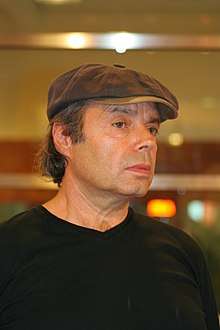Philippe Djian
Philippe Djian (French: [filip dʒjɑ̃]; born 3 June 1949) is a popular French author of Armenian descent. He won the 2012 Prix Interallié for the novel "Oh..." (Elle [1] for the English translation).[2][3]
Philippe Djian | |
|---|---|
 Philippe Djian in 2009 | |
| Born | 3 June 1949 Paris, France |
| Occupation | Novelist |
| Language | French |
| Nationality | French |
| Alma mater | ESJ Paris |
| Period | 1981–present |
| Notable works | 37°2 le matin |
| Notable awards | Prix Interallié (2012) |
Life and career
Djian graduated from the ESJ Paris. After a period of wandering and odd jobs, he published a volume of short stories, 50 contre 1 (1981), and then the novels Bleu comme l'enfer (1982) and Zone érogène (1984) before gaining fame with his subsequent novels 37°2 le matin (1985), Maudit Manège (1986), Echine (1988), Crocodiles (short stories) (1989), Lent dehors (1991), Sotos (1993), and Assassins (1994).
Five of his novels have been adapted into films: 37°2 le matin (1986; English title Betty Blue) which was filmed by Jean-Jacques Beineix, Bleu comme l'enfer (1986; English title Blue Hell) directed by Yves Boisset; Impardonnables (2011; English title Unforgivable) directed by André Téchiné; Love Is the Perfect Crime (2013; original title L'Amour est un crime parfait) directed by Arnaud Larrieu and Jean-Marie Larrieu; and Oh... (as Elle (2016) directed by Paul Verhoeven). He also co-wrote the screenplay of Ne fais pas ça (2004) with Luc Bondy.
The TV presenter Antoine De Caunes introduced him to Swiss singer Stephan Eicher. The two men became friends and Djian became the writer of Eicher's lyrics, at least for the songs in French.
Djian frequently moved (from Boston to Florence). Today he lives in Biarritz and, on average, writes a novel every 18 months. With Doggy Bag, written in 2005, he started a literary series with six seasons, inspired by American TV series.
Awards and honors
- 2009 Prix Jean-Freustié for Impardonnables[4]
- 2012 Prix Interallié for "Oh..."[2][3]
Bibliography
Novels
- Bleu comme l'enfer (1983; film: Blue Hell)
- Zone érogène (1984)
- 37˚2 le matin (1985; film: Betty Blue)
- Maudit manège (1986)
- Échine (1988)
- Lent dehors (1991)
- Sotos (1993)
- Assassins (1994)
- Criminels (1997)
- Sainte Bob (1998)
- Vers chez les blancs (2000)
- Ça c'est un baiser (2002)
- Frictions (2003)
- Impuretés (2005)
- Doggy bag, saison 1 (2005)
- Doggy bag, saison 2 (2006)
- Doggy bag, saison 3 (2006)
- Doggy bag, saison 4 (2007)
- Doggy bag, saison 5 (2007)
- Doggy bag, saison 6 (2008)
- Impardonnables (2009; film: Unforgivable)
- Incidences (2010)
- Vengeances (2011)
- "Oh..." (Gallimard, 2012 - trans. as Elle by Michael Katims, Other Press 2017)
- Love Song (2013)
- Chéri-Chéri (2014)
Short stories
- 50 contre 1 (1981)
- Crocodiles (1989)
- Lorsque Lou (1992)
- Contes de Noël (1996)
- Mise en bouche (2003)
References
- Elle. New York: Other Press. 2017. pp. http://www.otherpress.com/books/elle/. ISBN 978-1-59051-916-5.
- Astrid De Larminat (November 14, 2012). "Philippe Djian, prix Interallié". Le Figaro (in French). Retrieved November 25, 2012.
- Staff writer (November 14, 2012). "VIDEO. Le prix Interallié pour Philippe Djian". L'Express (in French). Retrieved November 25, 2012.
- "Prix Jean Freustié" (in French). Retrieved June 5, 2009.